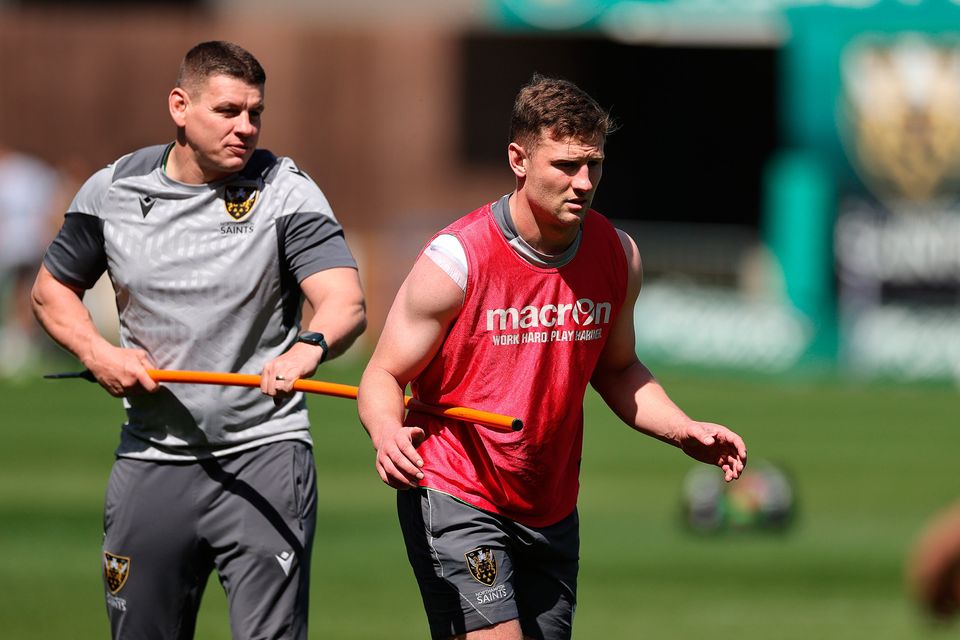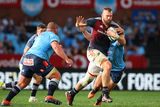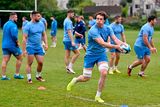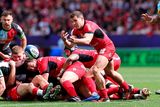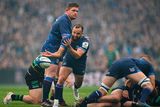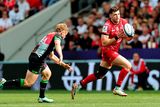‘We’ve had Lee come in with a big influence from rugby league’ – Defensive sins of Saints firmly in past after Lee Radford’s impact
Fraser Dingwall is held back by Northampton Saints defence coach Lee Radford during a training session held at the cinch Stadium at Franklin's Gardens on Tuesday. Photo: David Rogers/Getty Images
Northampton Saints were once sinners in defensive matters but the arrival of the latest rugby league guru to the Midlands has transformed them from perennial late season chumps into potential champs.
Much admired under avuncular Kris Boyd and former assistant, Phil Dowson (now the head coach), Saints were always well capable of flourishing in the regular roster but equally adept at folding at the business end.
Last season was a prime example, losing meekly to Saracens in the play-offs after operating with the second-worst defence in England.
In Europe, they couldn’t cope with the step-up in intensity, maintaining a miserable streak of 10 successive losses.
Then Lee Radford arrived last summer, with a bulging CV and an urgent intensity to shift the dial, while ensuring a bristling attack remained.
Their renewal with Saracens this year, Toulon’s big beasts too, marked an obvious sea change; the extraordinary 188 tackles of defiance against Glasgow in Europe marked them down as the Champions Cup contenders they have now become.
Radford arrived after winning the Challenge Cup with Hull in 2016 and 2017, before subsequently becoming Samoa’s defence coach when they reached the Rugby League 2021 World Cup final.
Newly-capped England centre Fraser Dingwall has experienced first-hand the gradual steel that has been applied to the velvety flair of one of England’s most fluent attacks.
“If you look at our team now, it is a product of the last five years and it all started with Kris Boyd,” says the 25-year-old one-club man.
“One of the first things he did was brought through a lot of the Academy boys at the time and developed us playing regular first-team rugby. So for me and George Furbank and Alex Mitchell to name a couple of others at the time.
“His whole big thing was for us to increase our attacking game, but also with a bit more of a hardened edge and that’s what we’ve managed to add on a little more to our game this year.
“We’ve had Lee come in with a big influence from rugby league and he has kind of given us more of that. And that has allowed our season to blossom a little more.”
Their defensive stats in Europe alone mark this out; of the four semi-finalists, they have conceded less penalties in defence, made more tackles while missing less and have the best tackle rate. Domestically, they are conceding on average two tries less per game, despite a Twickenham aberration with a weakened team last weekend against Harlequins, and concede less territory in the tackle than any other side.
So much so that they are chasing two hares, a domestic title and a European crown to add to their sole win in 2000; that year they defeated Munster in the final as they did spectacularly in this campaign – doing so with just 14 men reflecting their tougher edge.
“We’ve taken a lot from that game,” he admits of a titanic struggle when fellow 2024 England debutant, out-half Fin Smith, helped guide his side home.
“I think it’s actually fortunate enough for us that it hasn’t been the only occasion this year where we’ve had games like that, where we’ve been down and out as such, and wrestled it back to come away with a victory.
Croke Park Groundsman talks about the challenges of making the pitch rugby ready
“All of these games have offered a lot of learning and opportunities for us. What that one on particular showed us is that when you’re away and things aren’t going your way, it takes a lot of small movements and little bits done well to just get that bit of momentum and it can all change.
“Away from home, it’s never smooth sailing but you’ve just got to fight to find a way. We’ve had exposure to it this year and the squad are in a really good place around traveling away to different grounds, crowds being against you, refs not necessarily giving you too many ins, the scoreline being against you, and just fighting and competing in every little aspect of the game to find a way to come away with a victory.”
Croke Park will not cow them; they have been well-versed on its history by Irish staff member, S&C coach Eamonn Hyland. They arrive in Dublin today and will walk the venue tomorrow.
They will pay reverence, not deference.
Playing in Twickenham last week will help, so too a vigorous fortnight competing domestically, whereas Leinster have rested their frontliners in that time.
“The boys are very much aware of the massive history that ground holds, so for us to be given the opportunity to play there is something we’re really excited by and we’re honoured by forming part of the history of that stadium,” adds Dingwall.
Only the very best – Leinster, Toulouse, Leicester, Wasps, Saracens and Toulon – have claimed domestic and European doubles. Can Saints possibly join such illustrious company?
“Recent history shows it is possible and I don’t see any reason why we couldn’t do it but it’s not something that just happens,” insists the midfielder who debuted for England against Italy in round one of the Six Nations, scoring his first try against Wales a week later.
“It comes from each week, you fight for each week and every team will be coming after you, especially when you’re sat at the top of your league. That means that everyone’s got a bounty on your head.
“You’ve got to be hungrier than those people who are chasing after you. It’s a week at a time but I don’t see any reason why we can’t.”
